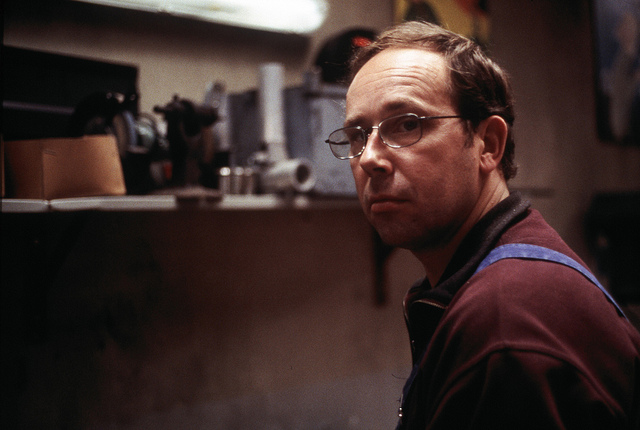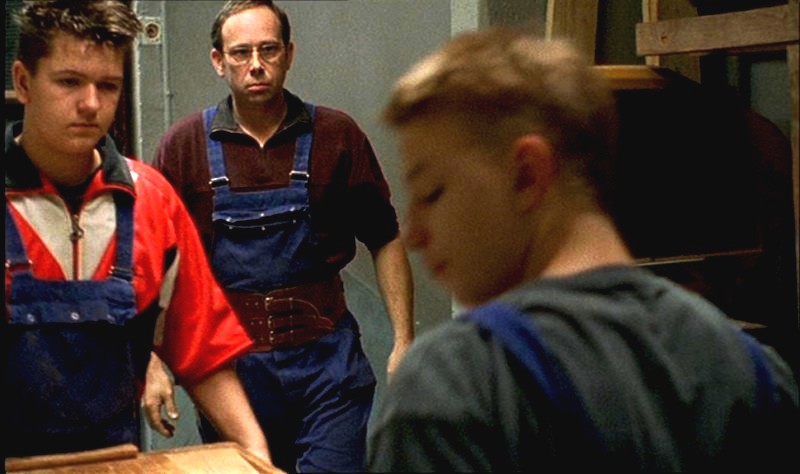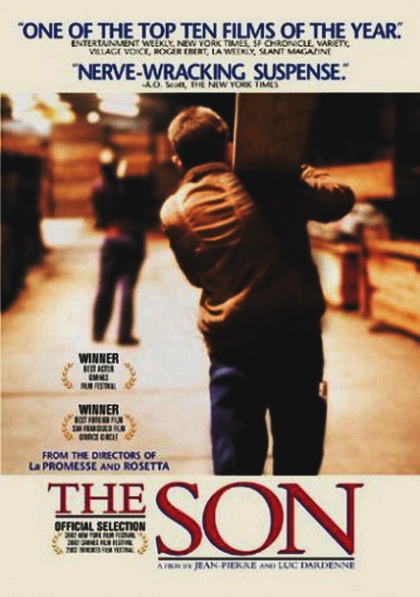
Serious patience required. So artsy in its naturalism it’s grueling, but not only is this particular film worthwhile, it’s worth getting acquainted with all of the Dardenne Brothers’ work. Their entire film of The Son (2002, France, also known as “Les Fils”) has the camera in medium shot within three feet or so of Olivier (Olivier Gourmet), a Belgian who teaches carpentry to young apprentices at a community center. He tells a social worker that he doesn’t have room to take on another student, and so the new kid is rejected. Then he sees the new kid, Francis (Morgan Marinee), and insists now in granting him entry. He obsessively watches Francis’ behavior around the center, often stalking from behind. This is odd because we know that Olivier is a good man with some unknown heartache, who conducts himself with patience and goodwill towards all, who takes his job seriously… and hasn’t thought about hurting anyone for a long time.
(SPOILER ALERT) In fact, he has only thought perhaps of hurting one person for a long time – out of anger, out of an unforgiving heart. That person he has thought about hurting is the boy that strangled his own son to death five years ago. That boy is Francis. Reasonably, Francis does not know that Oliver is the father of the boy he killed years ago. He has just spent five years in juvenile delinquent lock-up.
Olivier, a willowy figure with bumps and bruises, bespectacled, going bald, isn’t the most attractive man. One afternoon, he has a fairly attractive woman over. You wonder what is the nature of their business. It turns out she was his ex-wife. He must have been a happier man at one point, and by stretching that possibility, you might see how they were once married. They exchange some pleasantries, but he lets her go. He doesn’t have the heart just yet to tell her of the horrible coincidence of Francis coming into his life. She will find out later and respond with aghast.
 You can gather that the nature of the movie is not quick to tell all, that it sticks to the ordinary and mundane, to make us watch with observance of Oliver and Francis and allow the motivations and thoughts behind the characters gradually, naturally unveil themselves. Olivier welcomes the boy to join him on a Sunday visit to the lumberyard, just the two of them. Francis can learn special tricks of the trade in this exclusive teacher/pupil outing. The suspense of the movie is wondering whether Olivier’s intentions are of malice or of goodwill. Francis naively discloses that he is in such bad needing of a mentor, a father figure, that he asks Olivier if he would be his adopting parent.
You can gather that the nature of the movie is not quick to tell all, that it sticks to the ordinary and mundane, to make us watch with observance of Oliver and Francis and allow the motivations and thoughts behind the characters gradually, naturally unveil themselves. Olivier welcomes the boy to join him on a Sunday visit to the lumberyard, just the two of them. Francis can learn special tricks of the trade in this exclusive teacher/pupil outing. The suspense of the movie is wondering whether Olivier’s intentions are of malice or of goodwill. Francis naively discloses that he is in such bad needing of a mentor, a father figure, that he asks Olivier if he would be his adopting parent.
This is incredulous to Olivier, who uses this as a chance to probe the boy with serious questions so he can get to the heart and soul of this kid who ruined his life years ago. Olivier fumes, but as the drive to the lumberyard continues, the unassuming inquiry continues. Everything is unfolded in as approximate to “real time” as possible, with little jump cuts to the minutes ahead. Olivier, fumbling about in words, gets to ask the boy if he’s sorry about what he’s done.
The Dardennes always direct their films with a quasi-documentary verité style. If their films are indeed grueling, it’s only because they require undivided attention and to follow with sharp observance. Their lastest film success is “The Kid with the Bike.”
FOREIGN FILM / ADULT ORIENTATION / WINTER DESPAIR
Film Cousins: “The 400 Blows” (1959, France); “Rosetta” (1999, France); “L’Enfant” (2005, France); “The Kid with a Bike” (2011, France).





